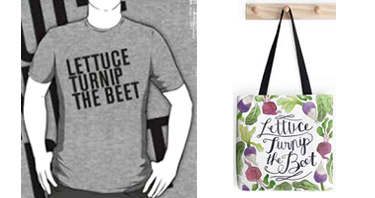The owner of the trademark “LETTUCE TURNIP THE BEET” cannot prevent third parties from printing the mere phrase on t-shirts, tote bags, or other products. The U.S. Court of Appeals for the Ninth Circuit affirmed on January 20, 2021 that consumers are likely to purchase such products because they find the phrase aesthetically pleasing and not because they associate the phrase with any particular source. LTTB LLC v. Redbubble, Inc., 19-16464 (9th Cir. 2021).
LTTB LLC, the owner of incontestable U.S. trademark registrations for “LETTUCE TURNIP THE BEET,” sued Redbubble Inc., an online print-on-demand marketplace, for trademark infringement, counterfeiting, and contributory infringement over use of this phrase on products. The Northern District of California granted Redbubble’s motion for summary judgment, and LTTB appealed.
| LTTB’s Use |
 |
| Use on Redbubble |
 |
Although LTTB owns incontestable U.S. trademark registrations for “LETTUCE TURNIP THE BEET” for clothing, the right to use registered marks is subject to nine “defenses or defects” listed in 15 U.S.C. §115(b), including that “the mark is functional.” Here, the Ninth Circuit concluded that the “LETTUCE TURNIP THE BEET” mark is functional because it “improves the usefulness or appeal of the object it adorns” and therefore exclusive use of the mark “would put competitors at a significant non-reputation-related disadvantage.”
LTTB presented evidence of the popularity of its goods, including photos of musician Jason Mraz wearing a t-shirt and images showing t-shirts worn on television programs Million Dollar Listing Los Angeles and Real Housewives of New York, but the Ninth Circuit held that the evidence did not raise a triable issue as to whether consumers buy the products because they identify LTTB as the source of the goods. The court distinguished the facts in Vuitton et Fils S.A. v. J. Young Enters., Inc. 644 F.2d 769 (9th Cir. 1981), where the plaintiff presented an affidavit by a buyer stating that buyers were unlikely to purchase a Vuitton product solely because of the aesthetic characteristics of the Vuitton trademark rather than an association of that trademark with Vuitton.
The Ninth Circuit concluded that LTTB presented no evidence to avoid the conclusion that the “LETTUCE TURNIP THE BEET” mark serves an aesthetic purpose wholly independent of any source-identifying function, and therefore it affirmed the district court’s grant of summary judgment for Redbubble.




 />i
/>i

